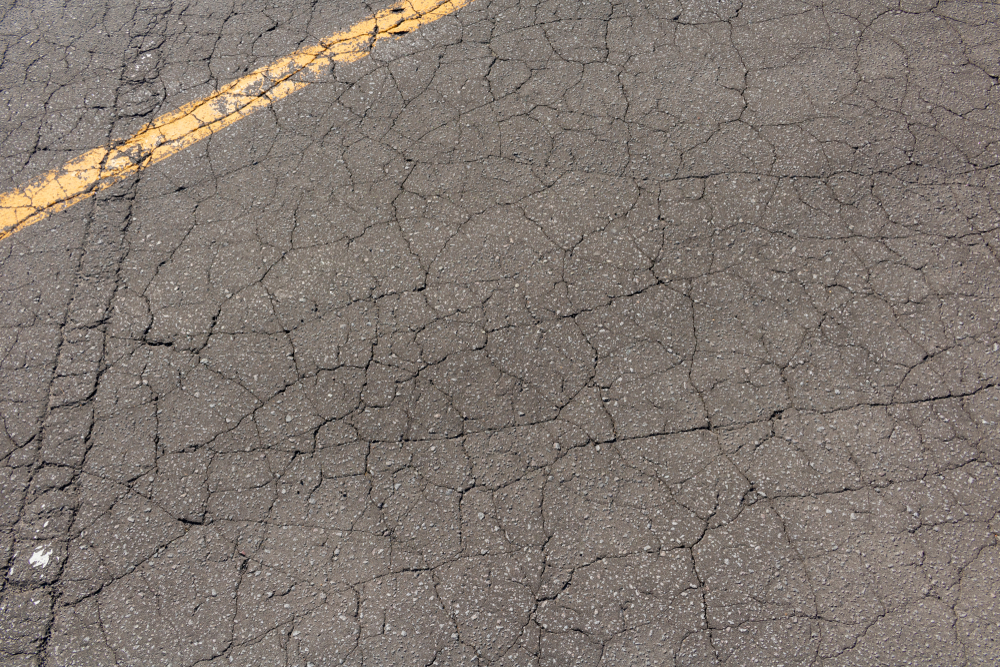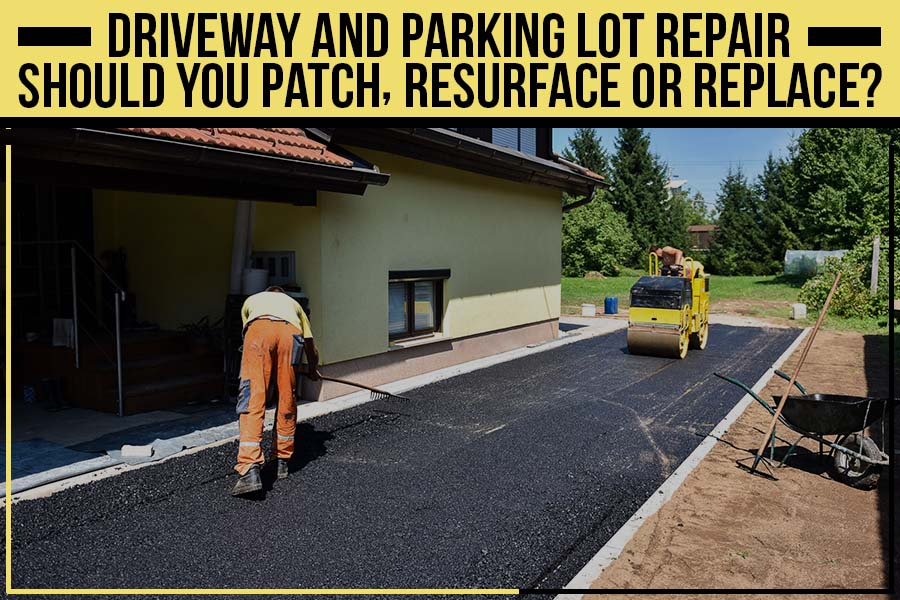Key Takeaways:
- There are three types of driveway repair: patching, resurfacing, and replacement.
- Asphalt patching is quick and inexpensive, but patches are sometimes invisible.
- Resurfacing is more expensive than patching but can often be completed in just a few days.
- Replacement provides a long-term solution that you will only repeat for a few years.
- Signs that your driveway needs repair include cracks in the concrete, potholes, spalling, discoloration, and an uneven surface.
If you’ve been driving around your neighborhood, you may have noticed that many driveways and parking lots look like they need repair. There are a few different ways to repair them, but deciding which option is the best can take time. This post will look at the three most common methods for repairing driveways and parking lots: asphalt patching, resurfacing, and replacing. We’ll explain each one in detail so you can decide which is right for your property.
What Are the Different Types of Driveway Repair?
When it comes to driveway repair, there are three main options: asphalt patching, resurfacing, and replacement. Each option has its own set of benefits & drawbacks, and the best choice for your needs will depend on how severe the damage is.
Driveway Patching
Asphalt patching may be the best option if you have a few small cracks or divots in your driveway. Patching is quick and relatively inexpensive and can extend your driveway’s life by several years. However, patches are only sometimes invisible & they may not be able to withstand heavy traffic or extreme weather conditions.
Resurfacing
Resurfacing is a more extensive repair than patching but can also significantly increase lifespan. When your driveway is resurfaced, a new layer of asphalt is applied over the existing surface. This new layer provides protection against weather damage and wear and tear.
Driveway Replacement
If your driveway is severely damaged, replacement may be the only option. Although it is the most expensive driveway repair option, replacement provides a long-term solution that will not need to be repeated for many years. When you replace your driveway, the entire surface is removed and replaced with new asphalt. This ensures that your new driveway will be level, smooth, and free of cracks or divots.
Signs That Your Driveway Needs Repair
1. Cracks In Your Driveway
Cracks can occur for several reasons, including tree roots, shifting soil, and extreme weather conditions. If left unrepaired, cracks will only continue to grow and can eventually lead to the collapse of your driveway.
2. Potholes
Another sign that your driveway needs repair is potholes. Potholes are caused by water seeping into the cracks in your driveway and then freezing and expanding. This process weakens the concrete and leads to craters or potholes. Potholes can be very dangerous, as they can damage vehicles or cause injuries if someone were to trip and fall.
3. Spalling
Spalling is another common problem that can occur with driveways. Spalling occurs when the concrete surface begins to flake off or chip away. This is caused by exposure to salt, which can cause corrosion of the rebar or other metal reinforcement within the concrete.
4. Discoloration
If you notice that your driveway is beginning to change color, this could be a sign that it needs repair. The discoloration is often caused by stains from oil, grease, or other fluids that have been spilled on the driveway. Over time, these stains will penetrate the concrete and cause it to change color. In some cases, the discoloration can also be caused by efflorescence. This white powdery substance forms on the surface of concrete when water evaporates from within the pores of the concrete.
5. Uneven Surface
Another sign that your driveway needs repair is an uneven surface. Several factors, including settling soil, tree roots, or poor construction techniques can cause an uneven surface. A rough surface can be dangerous, as it can create trip hazards or cause vehicles to bottom out when driving over it. An uneven surface can also lead to water pooling on your driveway, further damaging the concrete or creating a breeding ground for mosquitoes & other pests.

How Do You Repair A Cracked Driveway?
Over time, the sun and rain can cause asphalt driveways to crack and crumble. While you can repair small cracks with a do-it-yourself asphalt patch, larger cracks require professional help left unattended; a cracked driveway can lead to serious problems, such as potholes or complete pavement failure.
To repair a crack in your driveway:
- Clean the area around the gap with a wire brush and shovel.
- Remove loose pieces of asphalt, gravel, or dirt from the cracks.
- Fill the crack with an asphalt repair caulk or sealant.
- Use a putty knife or trowel to smooth out the sealant.
- Allow the sealant to dry for 24 hours before driving on it.
Related: What to Do About Cracks in a Concrete Driveway?
How Do You Repair Potholes?
Potholes can be a nuisance, and they can also cause damage to your car. If you have a pothole in your driveway, you can take a few simple steps to repair it.
- First, use a shovel to remove debris or loose asphalt from the hole.
- Next, fill the void with sand or gravel, and tamp it down with a tamper or your foot.
- Once the hole is filled, mix up some cold-mix asphalt according to the instructions on the bag.
- Pour the asphalt into the hole, then use a trowel to spread it evenly.
- Finally, compact the asphalt with a tamper or your foot.
- Once the asphalt has been set, it will be strong enough to withstand traffic.
Following these simple steps, you can quickly and easily repair a pothole in your driveway.
Related: Sealcoating Standards – Do’s and Don’ts
How Much Will Driveway Repair Cost?
For small cracks and chips, you can expect to pay around $100. More significant damage, such as large cracks or potholes, will cost closer to $500 to repair. If your driveway needs major resurfacing, the cost can be upwards of $3,000. While this may seem like a lot of money, it’s important to remember that a driveway is a crucial part of your home’s infrastructure. Not only does it provide a smooth surface for vehicles to travel on, but it also helps to keep water and debris from flowing onto your property. As such, investing in regular maintenance and repairs can help prolong your driveway’s life and keep it looking its best.
Ready to add some curb appeal to your home?
A new driveway or patio from Purcell’s Paving and Masonry can do just that! We offer first-rate driveway and patio installation services, ensuring a high-quality finish in Berkeley Heights, NJ, that will last for years.
Our patios are top-quality, with a wide range of options. We can build patios in any shape or size you prefer to create the perfect space for your needs. Whether you want to make a place to relax or entertain guests, our patios are the ideal solution.
Posted in Purcell’s Paving And Masonry Blog | Comments Off

